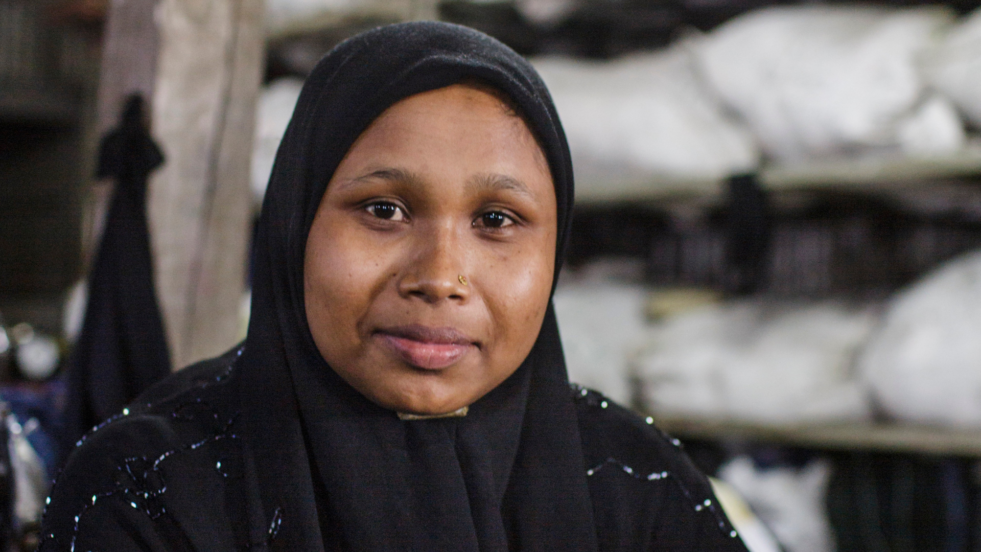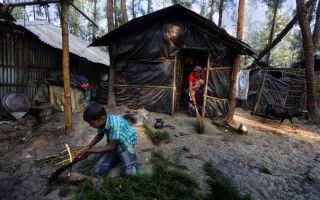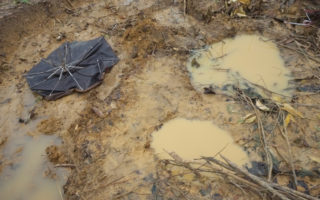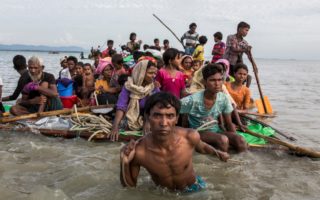
In Nayapara refugee camp, 23-year-old Zahida hopes to use her new skills and savings to buy her very own sewing machine. ©UNHCR/Andrew McConnell
It’s the start of the work day in Nayapara refugee camp in Bangladesh, and a group of Rohingya refugee women are hard at work producing items that make up some of the contents of UNHCR’s female hygiene kits.
The kits are distributed to refugee women of reproductive age twice a year and include underwear, washable cloth sanitary napkins and other essential items.
“I had no idea how to sew before,” said 31-year-old Anwara Begum, a single mother who fled violence in Myanmar in the early 1990s. “My husband had left me and I was bringing up a young baby girl on my own. She’s now five years old. This project has helped a lot.”
Since the project started in 2011, hundreds of women have benefitted. Each woman entering the program receives three months training, followed by three months on-the-job experience.
UNHCR’s partner, Technical Assistance Inc. is one of the many organizations helping women improve their economic situation through safe employment, enabling them to regain control of their lives.
Not only are they learning new tailoring skills and using the products that they are making, but many are managing to save enough money to buy their own sewing machines and work from home once they have graduated from the project.
During work experience, depending on their output, women can earn up to 6,000 taka (about $95), enough to help them to set up a business.
“This work allows me to earn money and take care of myself,” said 20-year-old Nasima Aktar, who was born in Nayapara refugee camp. “I feel really good and proud to be working here.”
Laila Arjuman Banu, a community mobilization associate with Technical Assistance Inc. says that income generation and skills training are important, but the program has also helped women gain confidence and take more control over their lives.
“Before, there were no opportunities like this for women,” she said. “Now, they don’t have to spend all the time in their homes, but they can get the skills training and earn an income. They feel proud about themselves.”
Sixteen per cent of Rohingya refugee households are headed by a single mother. More than 75 per cent of refugees in Bangladesh are women and children. With support from UNHCR, women are beginning new lives and restoring their futures.
Your donation at work
Since the influx of hundreds of thousands of Rohingya refugees in 2017, UNHCR has continued to support those seeking safety in Bangladesh.
In 2018, thanks to timely donations, UNHCR was able to help protect vulnerable Rohingya refugees against Bangladesh’s monsoons. Our team distributed more than 91,000 shelter upgrade kits and almost 85,000 pre-monsoon kits.
We also addressed weather-related health and sanitation needs, constructing 958 latrines and 112 water points for Rohingya refugees who were relocated from areas of the settlement at high risk for flooding and landslides.
However, more is needed and providing essential services to the 1.3 million refugees in Bangladesh in need of humanitarian assistance will require continued support.





